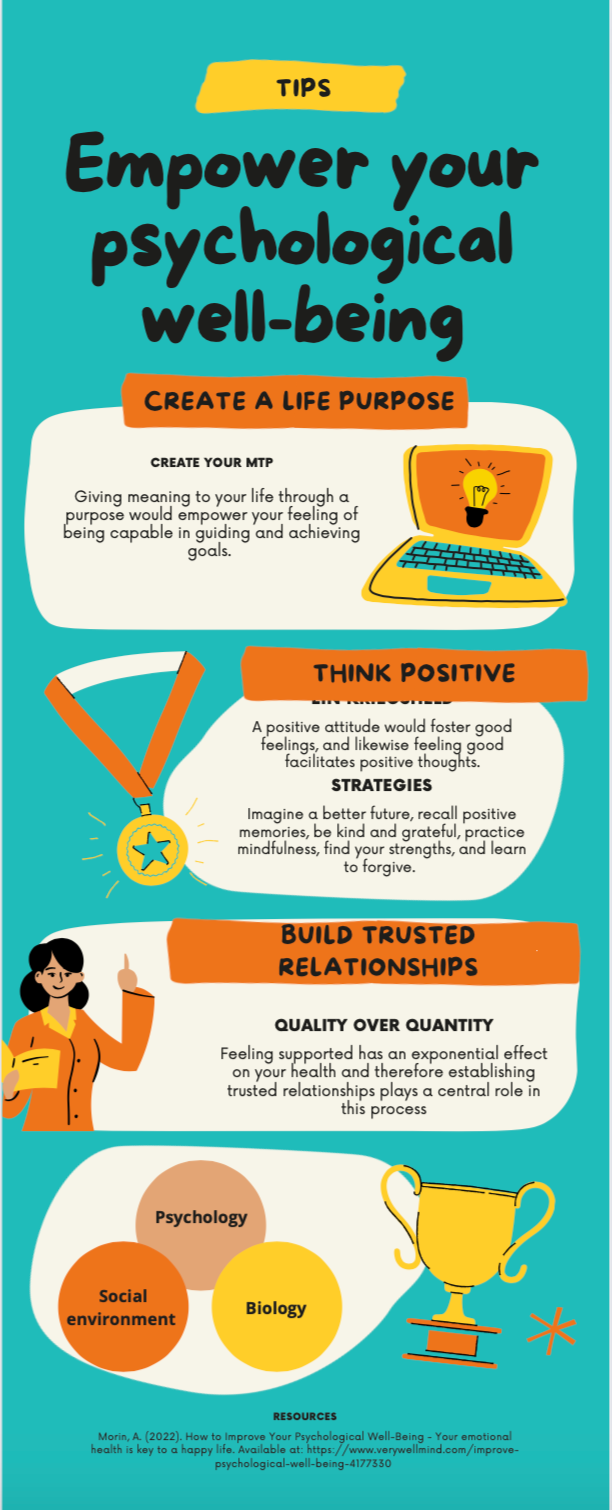
The Psychology of Wellbeing: From Scarcity to Abundance
Wellness influences a variety of dimensions in our lives (e.g., physical health, emotional stability, relationships, and material resources). Even when individuals try to adopt positive behaviors, anxiety and depression are always on the prowl.
“Wellness is the complete integration of body, mind, and spirit - the realization that everything we do, think, feel, and believe has an effect on our state of well-being.” (Greg Anderson)
Why does your psych matter? And what can you do to reverse your health from “scarcity” to “abundance”? Which actions or mindsets should you acquire to foster your well-being? Have you heard about emotional eating or psychosomatic illnesses?
In this article, I will discuss how emotions may affect our behavior and how health psychology investigates biological, social, and psychological factors that influence our health, promoting and embracing a proactive attitude to prevent illness.
Health psychology and illness
Around the 1970s, healthcare had to face novel challenges while responding to different clinical and social needs (e.g., life expectancy, chronic diseases, lifestyles). Accordingly, health psychology was born as a discipline to investigate psychological, behavioral, and cultural factors related to health and illness. Through a biopsychosocial approach, health psychologists explain health due to biological, behavioral, social, and psychological influences. Therefore, investigating these variables on health processes would allow psychologists to support individual patients and groups through public health programs and interventions. Indeed, division 38 of the American Psychological Association refers to it while focusing on a clear understanding of healthcare and health policy's role in empowering the underlying process. Hence psychologists and health professionals collaborate at different levels of this complex system to promote wellness with a proactive approach. Due to the relevance of this discipline for promoting the individual and, more generally, public health, this field of study grew quickly in the context of clinical psychology. However, other areas have been defined such as health psychology, public health psychology, community health psychology, and critical health psychology. [1]
In addition to understanding those factors leading to illness or supporting wellbeing, health psychologists are also interested in observing how individuals or groups react, cope, and recover from illness. In this fashion, behavior becomes highly determinant for health, while prevention and education on healthy choices become the key to sustaining well-being. In 2012, a recent CDC report shows that even though the rate of death previously linked to the common leading causes declined, the increase in life expectancy was followed by deaths determined by preventable causes such as stroke and heart disease. Therefore, the role of health psychologists is to decrease those unhealthy behaviors and risk factors to empower and foster health in individuals, groups, and communities. Research activities are carried out in several sectors such as stress reduction, nutrition, counseling, prevention, recovery from illness, teaching coping skills, and healthy behaviors (e.g., weight management, smoke cessation, diminishing risky sexual behaviors). Thus, the biosocial model in health psychology is the framework based on which health psychologists take actions while investigating: [2,3]
- Biological factors: personality traits and genetic factors;
- Psychological factors: personality aspects, character, stress level, and lifestyle;
- Social factors: type of relationships (family and social), cultural beliefs.
Overall, health psychologists focus on prevention through educational programs to overcome risky behaviors that lead to illness and psychological distress. Besides, these programs are also proposed to further educate any health professional while empowering an entire team of experts (e.g., nutritionists, nurses, physicians, other therapists) in achieving a common mission: health [2].
To know more about health psychology, read here.
Enhance your psychological well-being
How can you increase your well-being? And what does it mean to you? To answer these questions, The Psychology of Wellbeing is a book written by Gary W. Wood (2021) to empower readers through their well-being journey. The book explores those factors influencing our emotions and behaviors and how positive psychology would lead to understanding happiness and health. In addition, from a business perspective, the book gives an overview of the “wellness economy,” highlighting the role that the self-care and self-help industry may play in the process of wellbeing.
Doing things right or doing the right thing? Wellness is way more than just doing things right. Indeed, wellness influences a variety of dimensions in our lives (e.g., physical health, emotional stability, relationships, and material resources). Even when individuals try to adopt positive behaviors, anxiety and depression are always on the prowl. Instead of focusing on single factors, the evaluation of them as a whole would allow a proper understanding of vicious circles that lead to a negative state of being [4].
"Wellness is the compete for integration of body, mind, and spirit - the realization that everything we do, think, feel, and believe affects our state of well-being." (Greg Anderson)
Wellness is not just “feeling well and happy,” but is a skill that empowers individuals to expand knowledge, enrich themselves, and achieve life goals. Therefore, key questions to ask yourself are [4]:
- Do you feel alright?
- If not, can you identify which factor makes you feel wrong?
- Which are your goals to improve it?
- Are you motivated to overcome challenges?
- Are your goals in line with your life purpose?
“We can improve the quality of our lives. Wellness is a practice of patience and acceptance.”
Published in the journal Applied Psychology: Health and Well‒Being, Huppert defines well-being as “the combination of feeling good and functioning effectively” [5] describing how people with high levels of well-being tend to feel more capable, happy, supported, and satisfied, although reporting lower distress does not always correlate with a state of well-being.
Why should you value your psychological well-being?
Feeling good and effective are not the only reasons to promote your well-being. Studies found that higher psychological well-being is related to healthy longevity, life quality, fewer social issues (e.g., fewer crimes, alcohol and drug abuse) [6], and prosocial behavior (e.g., engagement in volunteering and social activities). However, to promote well-being, the feeling of safety and fulfillment of basic needs are important factors to nourish psychological health. So, what can you do to promote your sense of well-being? [7]
- Create a life purpose: finding a purpose in life is the secret to well-being. A life purpose can also refer to simple actions that make you feel on the right path every day. Giving meaning to your life through a purpose would empower your feeling of being capable of guiding and achieving goals. What about your massive transformative purpose (MTP)? Defining your life purpose begins with identifying those most important values to you and by reflection on what you would like to see in others. Think of your powers and skills, which is the environment you would like to take action likewise, and who are the people you would help. Define your challenges and imagine who you will become once you achieve your life-purpose goals. Put it all together, and create your MTP!
- Foster positive thinking: a reciprocal relationship exists between well-being and thinking positive. Indeed, a positive attitude would foster good feelings, and likewise, feeling good facilitates positive thoughts. Hence, a few strategies help generate this process.
- Imagine a better future. Think of those things that make you happy. Define a plan of measurable goals and steps about how to achieve those. Put the plan into action and reach your life purpose.
- Nourish your mind with the best memories. Recalling positive life events happening throughout life would enhance your well-being by reminding you that life is rich in good things, and it will always be up to you to recognize them and be aware that you are in power in this process.
- Be kind to others and supportive. Your help, even through small actions, can make a difference. Additionally, by helping others, you would also do a favor to yourself by boosting your well-being and positive attitude toward life. Consequently, these actions would enhance endorphins and oxytocin release (hormones of feeling good), besides building novel neural connections. Performing kind actions would also foster self-reinforcing habits [8].
- Mindfulness is the basis of happiness and resilience [5]. Learning to be present and in the moment has benefits such as better management of stress, coping strategies, reduced sense of anxiety or depression, higher relaxation levels, and self-esteem.
- Be grateful. Practicing gratitude while recognizing even small good things that happen daily will improve your psychological status of feeling good. In addition, this will enrich your surroundings and be satisfied with life.
- Recognize and embrace your strengths. Being aware of your skills would allow you to feel capable and strong to overcome anything. Think of your best strengths and what you have already achieved. This will prove you can do anything if you believe in yourself and how much you can learn to upgrade your best version and, indirectly, your mental health.
- Learn to forgive. While anger tends to produce negative feelings, forgiveness would help in releasing anger and thus improving well-being. By forgiving someone, the negative status will be replaced by positive energies that would push you to practice good actions feeling happier. Learning to forgive means learning to release and move away from unnecessary anger and pain while embracing and welcoming self-compassion to potentially manage negative situations.
3. Build trusted relationships: feeling lonely has the effect of generating negative habits and unhealthy behaviors [9]. However, the number of relationships you create is not proportional to your well-being. Indeed, quality more than quantity defines your psychological well-being. Through gatherings or social media, connecting with people is necessary to feel part of this world and belong to a supportive environment. Feeling supported has an exponential effect on your health and therefore establishing trusted relationships plays a central role in this process.

After discussing a few tips to promote psychological well-being, what are the causes and consequences of psychological well-being? Which is the relation between positive emotions and cognitive processes? [5]
The review by Huppert (2009) investigated what causes positive aspects of well-being and which are the effects of these processes on cognitive, health, and social functioning. Individuals show different levels of well-being. Therefore the study explored the neurobiology of psychological well-being by reporting neuroscientific evidence of brain activity patterns and neurochemical effects underlying the development of well-being, particularly how socioeconomic, personality, demographic, and genetic factors play a role in determining mental well-being (as well as illness).
Based on survey data, and experimental and longitudinal studies, it was possible to conclude that creative thinking, prosocial behavior, and physical health were relevant factors associated with psychological well-being. Moreover, the environment and maternal care were also determinants of mental health and how individuals feel capable and psychologically well. However, despite negative experiences in unfavorable circumstances that affect behavior and neurobiological development, compensatory processes are possible in life. Similarly, our actions have an extraordinary effect on overcoming obstacles and negative events, and thus are central to improving well-being and positive attitude toward life. Moreover, by comparing different types of interventions, a universal approach (in contrast to target interventions) are more effective in improving the life quality of ordinary people (not just those already affected by disorders or at high risk to develop pathologies) by reducing the future number of people that may potentially develop disorders (preventive measures).
Lastly, the psychology of well-being is a discipline that focuses on supporting and fostering the individual’s growth and expansion and principally not on treating disorders. Hence, a novel approach in this science is necessary to promote personal and interpersonal development and prosperity. A universal approach would shift the attention from treating sickness to health and prevention [5].
Moving from scarcity to abundance
Previously discussed, psychological well-being results from the interaction between different factors. In particular, the socioeconomic and environmental variables were found to shape the process of individual flourishing and psychological health. So thinking ahead, what would be the effect of an economic model based on abundance rather than scarcity?
Typical economic models were driven by scarcity. Living with a scarcity mindset means limiting the access to resources (since these are finite) with the tendency to save and store instead of sharing and offering. However, entering a digital world, the latter matches what is happening, and in which resources are dematerialized (and consequently also demonetized) while opening the doors to abundance and democratization of goods.
Digitalizing content, shared through global networks, can disrupt any industry. Shifting from scarcity to abundance requires adopting a novel economic model that allows access to infinite resources, but also requires a novel education and pedagogic practice capable of managing it. Thus, the pedagogy of abundance was developed to describe how the educational system has changed in response to an environment that is fully digitalized, and how this disruption would impact learning. Indeed, the abundance and availability of learning materials greatly influence the way we approach learning (resource-based learning) or solve problems (problem-based learning) [10].
Developing an abundant mindset is the key to accessing resources fully for us and the global community. This has a tremendous impact on our well-being and positive thinking. Living in a world that is expanding while connecting people worldwide would combine and meet basic human needs. As a result, individuals feel connected, satisfied, and in power. Consequently, this fact would generate a cascade of proactive behaviors fed by motivation, self-esteem, and compassion.
To know more about the pedagogy of abundance read here.
“If you always attach positive emotions to the things you want, and never attach negative emotions to the things you don't, then that which you desire most will invariably come your way.” (Matt D. Miller)

References:
- David F. Marks, Michael Murray & Emee Vida Estacio (2018) Health Psychology. Theory-Research-Practice (5th Ed.) Sage". 2018-11-16.
- Cheery, K. (2021). Studying Health Psychology and Illness. Verywellmind. Available at: https://www.verywellmind.com/what-is-health-psychology-2794907 [Accessed on April 9, 2022]
- Mason PH, Roy A, Spillane J, Singh P. Social, historical and cultural dimensions of tuberculosis. J Biosoc Sci. 2016;48(2):206–232. doi:10.1017/S0021932015000115
- Murphy, F. (2021). Psychology of Wellness - A Deeper Look into Wellness. Flourishing Life Society. Available at: https://www.flourishinglifesociety.com/psychology-of-wellness.html [Accessed on April 9]
- Huppert FA: Psychological well-being: evidence regarding its causes and consequences. Applied Psychology: Health and Well‒Being. 2009;1: 137–164. doi:10.1111/j.1758-0854.2009.01008.x
- Kubzansky LD, Huffman J, Boehm J, Hernandez R, et al. Positive psychological well-being and cardiovascular disease: JACC health promotion series. Journal of the American College of Cardiology. 2018;72:1382-1396. doi:10.1016/j.jacc.2018.07.042
- Morin, A. (2022). How to Improve Your Psychological Well-Being - Your emotional health is key to a happy life. Available at: https://www.verywellmind.com/improve-psychological-well-being-4177330 [Accessed on April 12, 2022]
- Mathers N. Compassion and the science of kindness: Harvard Davis Lecture 2015. Br J Gen Pract. 2016;66(648):e525-7. doi:10.3399/bjgp16X686041
- Tiwari SC. Loneliness: a disease? Indian Journal of Psychiatry. 2013;55(4):320-322. doi:10.4103/0019-5545.120536
- Weller, M. (2011). A Pedagogy of Abundance. Spanish Journal of Pedagogy, 249 pp. 223–236.

For more on well being, check out Mindfulness Meditation: Improve Your Health in Nature - Untamed Space by Spencer Yeomans
ExO Insight Newsletter
Join the newsletter to receive the latest updates in your inbox.









